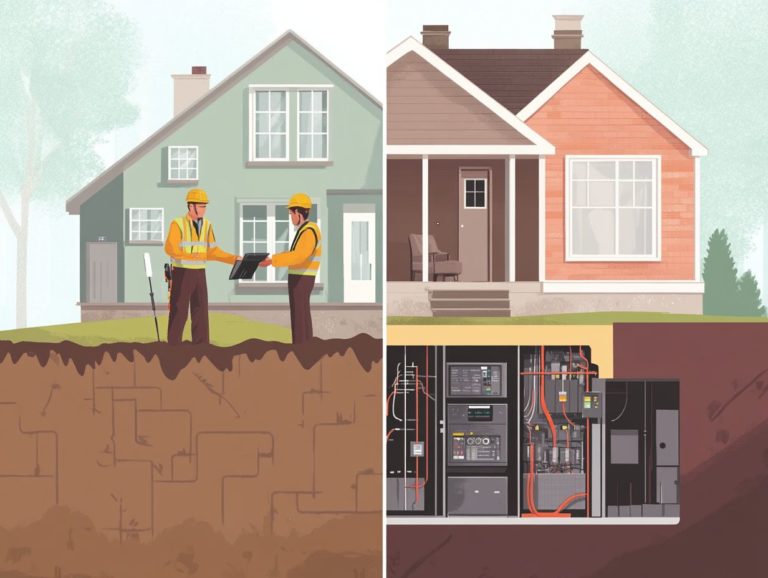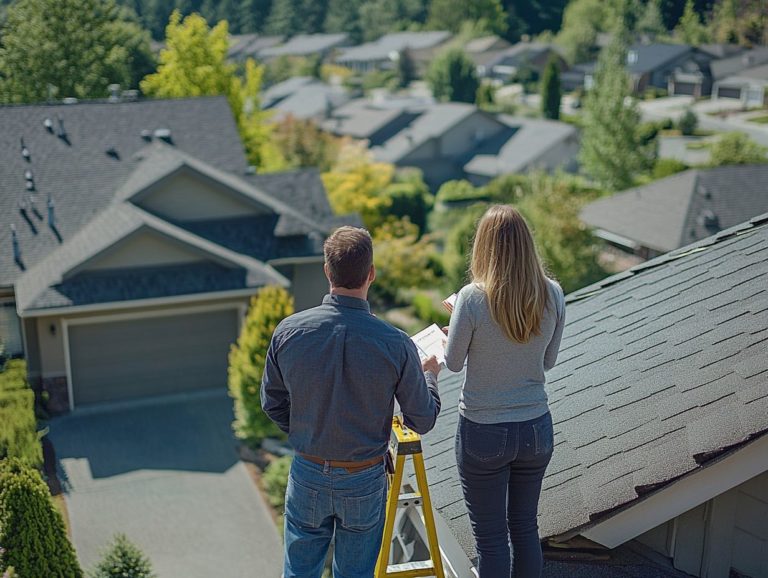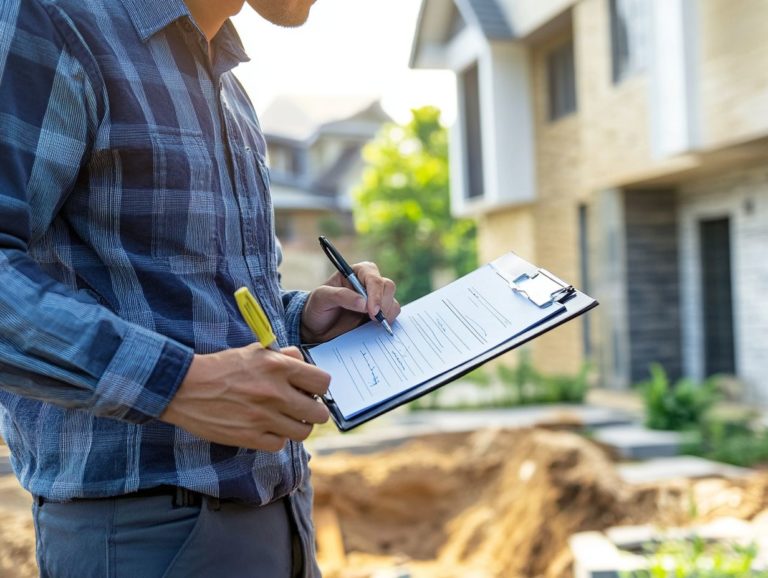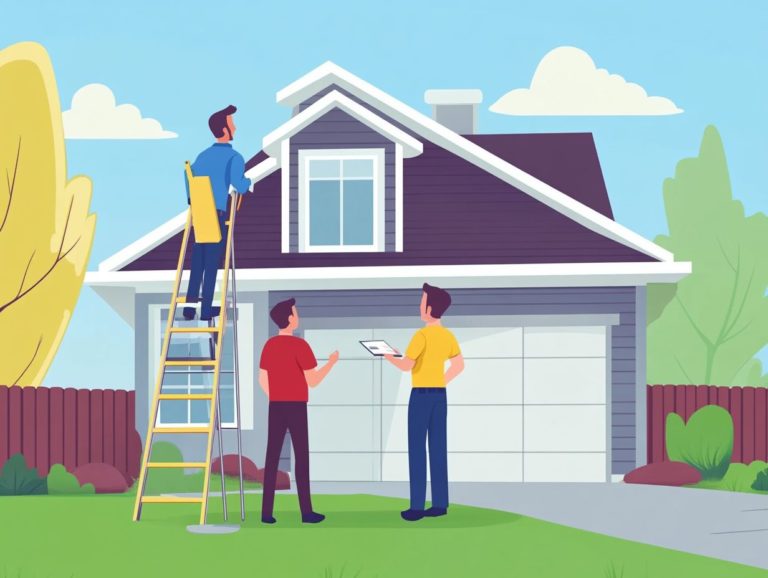Home Inspection FAQs for Buyers
Buying a home stands as one of the most significant investments you will ever make, so take charge of your investment it s absolutely crucial to ensure that investment is sound.
A home inspection plays a vital role in this journey, providing you with a thorough evaluation of the property’s condition. This article delves into what a home inspection involves, why it s essential for buyers like you, and what to anticipate during the process.
From understanding common issues that often arise during inspections to tips for selecting a qualified inspector, you ll discover valuable insights. Immerse yourself in this information to equip yourself with the knowledge necessary for making informed decisions as you navigate your home-buying journey.
Contents
- Key Takeaways:
- What is a Home Inspection?
- Why is a Home Inspection Important for Buyers?
- When Should a Home Inspection be Done?
- What Does a Home Inspection Cover?
- How to Find a Qualified Home Inspector
- What to Expect During a Home Inspection
- Common Issues Found During Home Inspections
- Dealing with Home Inspection Results
- Final Thoughts and Recommendations
- Frequently Asked Questions
Key Takeaways:

A home inspection is critical in the home buying process. It helps buyers understand the condition of the property and identify any potential issues, highlighting the importance of home inspections for buyers.
It can provide peace of mind and the opportunity to negotiate repairs or price reductions. Make sure to schedule your home inspection at the right time and choose a qualified home inspector.
What is a Home Inspection?
A home inspection is an in-depth assessment of a residential property that offers vital insights into its current condition, uncovering potential issues that home buyers may encounter during the purchasing journey. Knowing how to prepare for a home inspection as a buyer can help streamline this important process.
Conducted by seasoned home inspectors, this visual examination scrutinizes various facets of the property, including structural defects and safety concerns, making sure the home meets professional inspection standards.
Definition and Purpose
The definition and purpose of a home inspection focus on helping you understand a property’s condition through a thorough visual examination and a detailed inspection report that highlights any potential issues.
This process includes an examination of the structure, roofing, plumbing, electrical systems, and more, all aimed at uncovering hidden defects that could impact the overall safety and functionality of your future home.
By identifying concerns early, you re enabled to make informed decisions, negotiate repairs, or even reconsider your options. This proactive approach helps protect you from unexpected costs down the road.
The inspection is both a safeguard and an educational tool, arming you with the knowledge necessary to invest wisely in your new home. To ensure you make the most of this process, consider asking the key questions to ask your home inspector.
Why is a Home Inspection Important for Buyers?
Do not skip the home inspection it s critical for your buying success! A home inspection greatly amplifies your negotiation power throughout the home transaction process.
It offers a detailed overview of potential issues that could necessitate significant repairs or impact the property’s overall value.
By grasping the insights from the inspection findings, you can make well-informed decisions, ensuring that your investment in real estate is sound and perfectly aligned with your expectations.
Benefits and Advantages
- The benefits of a home inspection go far beyond a simple evaluation; it enables you to make informed decisions about your property investments while illuminating critical areas that may demand significant repairs.
- These inspections can lead to substantial financial savings by spotting potential issues before they balloon into costly repairs.
- Understanding the condition of a property’s essential systems not only offers you a clearer picture of its true value but also enhances your negotiation prowess.
- With factual findings from a comprehensive property evaluation in hand, you can approach sellers with confidence, potentially negotiating a lower purchase price or securing necessary repairs before closing.
- Spotting problems early in the buying process is vital, as it ensures you are fully aware of what you re committing to, guiding you toward more confident and strategic decisions.
Schedule your home inspection today!
When Should a Home Inspection be Done?

Determining the optimal timing for a home inspection is crucial in your home buying journey. This step allows you to carefully assess the property before finalizing your purchase agreement, usually occurring right after your offer is accepted but before the closing.
As you navigate this process, consider factors such as the length of the inspection, the availability of qualified inspectors, and any time-sensitive elements tied to your transaction. Making informed choices will help you succeed in your new home journey.
Best Time to Schedule and Factors to Consider
Selecting the optimal time for a home inspection is essential. It can profoundly influence your entire home purchasing journey.
Consider property availability, weather conditions, and the anticipated length of the inspection with careful thought.
Being in tune with local market conditions is equally important, as these factors can dictate both the urgency and timing of your inspections.
For example, in a hot real estate market, securing an inspection quickly can be the difference between landing your dream home or losing it to another buyer.
Conversely, in a slower market, you might enjoy more flexibility, allowing you to choose a time that aligns with your schedule.
Weather conditions shouldn’t be overlooked either; mild days often provide the best inspection circumstances, offering you a clearer view of the home’s overall condition.
What Does a Home Inspection Cover?
A thorough check of all parts of the house encompasses a wide array of areas and systems within a property, from the roof and foundation to the electrical systems, plumbing, and major appliances.
By noting down any problems found in the home inspection report, this process becomes an invaluable resource for you as a home buyer. Understanding the importance of a home inspection for buyers can provide a clear picture of the property’s overall condition while including an inspection checklist that highlights the key components that seasoned inspectors typically assess.
How to Find a Qualified Home Inspector
Finding a qualified home inspector is essential for securing a thorough and accurate assessment of your property. You should prioritize inspectors who have good qualifications from trusted organizations, like the American Society of Home Inspectors, a well-respected organization that sets standards for home inspectors.
Opting for a well-reviewed inspector not only guarantees reliable inspection services but also enhances your home-buying experience, enabling you to identify potential issues with confidence and clarity.
Research and Selection Tips
Researching and selecting a home inspector involves understanding the vital qualifications and criteria that contribute to an effective inspector. These factors can greatly influence the quality of the inspection report and your overall home-buying experience.
To ensure you choose an inspector with the necessary expertise, start by checking their certifications. These credentials demonstrate that the inspector has received relevant training and complies with industry standards.
Reading reviews from previous clients can provide valuable insights into the inspector’s professionalism and thoroughness. It s wise to seek recommendations from trusted real estate agents or friends who have recently purchased homes; personal experiences often lead to discovering a qualified professional who aligns with your specific needs.
What to Expect During a Home Inspection

During a home inspection, you can anticipate a thorough assessment process that usually spans several hours. An experienced inspector will conduct a meticulous examination of the property while articulating their findings in real-time.
This interactive experience not only offers you valuable insights into the home’s current condition but also equips you with essential knowledge regarding potential repair needs and safety concerns.
Common Issues Found During Home Inspections
Home inspections often uncover various issues. These can range from minor repairs to serious structural defects that may impact your property’s safety.
Identifying problems early in the purchasing process lets you prioritize maintenance. This proactive approach ensures you make informed decisions about your investment.
Potential Problems and Red Flags
Identifying potential problems and red flags during a home inspection is essential for you as a buyer. To ensure you cover all bases, consider these home inspection tips for first-time buyers. These issues can reveal underlying structural defects or the need for major repairs that might not be immediately apparent.
Take water damage, for instance those stains on ceilings or walls can be more than just an eyesore; they often indicate leaks that could lead to mold growth and hefty remediation costs.
Similarly, if you notice uneven flooring, it could be a sign of foundation issues, which are problems with the base of the house that support its weight. Brushing off these seemingly minor details during an inspection could land you with significant financial burdens later on.
A thorough inspection is not just a formality; it s your opportunity to uncover hidden concerns and make informed decisions, ultimately safeguarding your investment.
Dealing with Home Inspection Results
Upon receiving the home inspection report, you may find yourself at a pivotal crossroads. You will need to make important decisions about negotiating repairs or price reductions based on the findings.
By understanding the main repairs needed and their implications for the property’s value, you can skillfully use the inspection results to negotiate advantageous terms in the transaction. This approach not only enables you as a buyer but also safeguards the integrity of your investment.
Negotiating Repairs or Price Reductions
Negotiating repairs or price reductions after a home inspection is a pivotal moment in your home-buying journey. Here, you have the opportunity to leverage insights from the inspection report to ask for necessary changes based on significant repairs identified.
To enhance your effectiveness in these discussions, adopt a collaborative mindset. Carefully review the inspection findings and prioritize the most pressing issues that deserve attention or financial concessions.
Present the inspection report clearly, accompanied by suggested fair repair costs, to establish a solid factual basis for your negotiation. Using techniques such as mirroring the seller’s language and actively listening can create a more amicable atmosphere.
A well-prepared negotiation strategy not only underscores goodwill but also ensures that both you and the seller feel heard and respected throughout the process.
Final Thoughts and Recommendations

Final thoughts and recommendations regarding home inspections highlight their vital role in your home-buying journey. It’s crucial for you to thoroughly review inspection reports and consider any potential issues before finalizing your purchase. For more insights, refer to the understanding the home inspection process for buyers.
It’s also important to collaborate closely with experienced inspectors. They can offer invaluable insights into the property s condition that you won t want to overlook.
Remember, asking questions during the inspection process is essential to fully grasp any concerns that might be flagged. Recognizing that home inspections for first-time buyers are not merely a box to check off but rather an integral part of maintaining your property’s integrity is vital for long-term upkeep.
Act now to invest time upfront, and you could save significantly and avoid future headaches! Ultimately, this approach helps you secure a smart investment in your home!
Frequently Asked Questions
What is a home inspection and why is it important for buyers?
A home inspection is a thorough assessment of a property’s condition, typically performed by a professional inspector. It is important for buyers because the benefits of home inspections can help identify any potential issues or safety hazards in the home, allowing them to make an informed decision before purchasing.
When should I schedule a home inspection?
It is recommended to schedule a home inspection as soon as possible after your offer has been accepted. This will give you time to review the inspection report and address any concerns before the closing date.
Who pays for the home inspection?
The buyer usually pays for the home inspection. Sometimes, sellers may cover the cost during negotiations.
What does a home inspection cover?
A home inspection covers structural elements, exterior features, roofing, plumbing, electrical, heating, and cooling systems.
Inspectors may also test for radon or mold.
Can I attend the home inspection?
Yes! It’s recommended for buyers to attend the inspection. You’ll gain valuable insights by being present, and you can ask questions and discuss any concerns with the inspector, especially when considering the pros and cons of home inspections for buyers.
What happens if the home inspection uncovers issues?
If issues arise, the buyer and seller must negotiate a resolution. This could involve repairs, credits, or even deciding to walk away from the deal.






